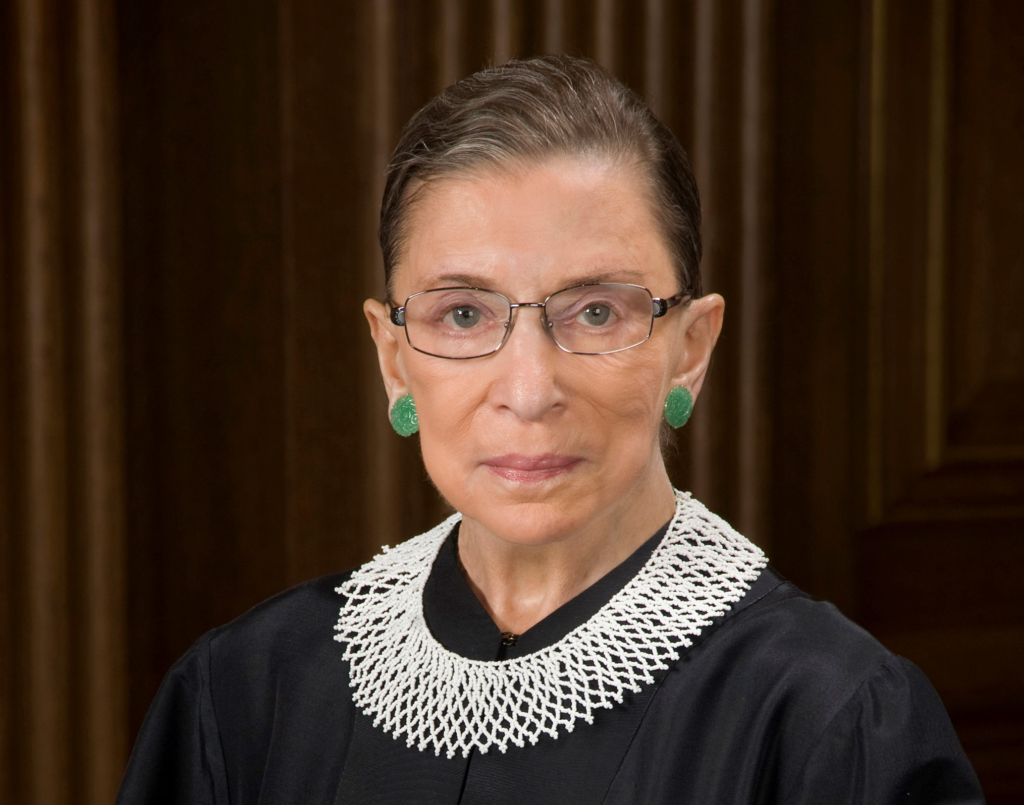Ruth Bader Ginsburg Posthumously Unites the Nation

Image courtesy of Medium
By Eva Lynch
Ruth Bader Ginsburg, famed Supreme Court Justice and champion of women’s and human rights, died at home surrounded by family on Friday. She was 87.
The Supreme Court announced her death and credited it to complications with metastatic pancreatic cancer, which Ginsburg had been fighting along with colon cancer and lung tumors since 1999.
The surge of public response, largely evident on various social media platforms, was overwhelming and began seconds after Ginsburg’s death was announced. Those paying their respects and sharing stories of how Ginsburg’s work in politics directly impacted them represent all sides of the aisle: trailblazing athletes like tennis icon Billie Jean King and women’s soccer champion Megan Rapinoe as well as the Golden State Warriors team and the WNBA; entertainers like actors Mark Ruffalo, Robert Downey Jr., and Mindy Kaling; and giants in the political field like Senate Majority and Minority Leaders Mitch McConnell and Chuck Schumer, as well as President Donald Trump.
“She led an amazing life,” Trump said. “What else can you say? She was an amazing woman.”
Former Vice President and Democratic presidential candidate Joe Biden and his running mate Senator Kamala Harris were also among the many politicians who tweeted their grief.
“Ruth Bader Ginsburg stood for all of us. She was an American hero, a giant of legal doctrine, and a relentless voice in the pursuit of that highest American ideal: Equal Justice Under Law,” Biden’s tweet read.
“Tonight we mourn, we honor, and we pray for Justice Ruth Bader Ginsburg and her family. But we also recommit to fight for her legacy,” said Harris, adding her prayers for Ginsburg’s family, especially during the Jewish holiday Rosh Hashanah.
But this mournful response to Ginsburg’s death was not unique to celebrities and politicians; the social media response from Americans across the nation rang worldwide, as millions of Americans sat in and tweeted about their denial of the passing of an American hero. While the full political impact of her death will not be observable until a replacement justice has been named, experts say that Democratic and independent voters’ strength of response so quickly after Ginsburg’s passing is significant in the face of one of the most contentious elections in history.
Ginsburg leaves behind a nation in mourning and a legacy that will ensure she is never forgotten.
She was appointed to the Supreme Court in 1993 by then-President Bill Clinton. Ginsburg’s arrival in the high court followed years of toil and rejection on the basis of her sex, including her education at Harvard Law as one of nine female students among 500 in her class, her role as a new mother, nursing her husband back to health from cancer, and constant beratement from academic authorities for taking a man’s spot at the university. She followed her husband to New York following his graduation and graduated from Columbia Law herself in 1959, tied for best in her class.
While the list of Ginsburg’s accomplishments in the Supreme Court and her political career in general is far too comprehensive to list, there are several notable contributions to human and women’s rights which cannot go unmentioned. Here are the 4 most impactful Supreme Court decisions of which Ginsburg was a critical part.
United States v. Virginia, 1996
In a 7-1 decision, Ginsburg was critical in striking down the then-all-male Virginia Military Institute’s (VMI) gender-specific admissions policy, which was determined to be in violation of the Equal Protection Clause of the Fourteenth Amendment, and protecting the equal right to education nationwide.
“‘A prime part of the history of our Constitution,’ historian Richard Morris recounted, ‘is the story of the extension of constitutional rights and protections to people once ignored or excluded,’” said Ginburg, who delivered the decision. “VMI’s story continued as our comprehension of ‘We the People’ expanded. There is no reason to believe that the admission of women capable of all the activities required of VMI cadets would destroy the Institute rather than enhance its capacity to serve the ‘more perfect Union.'”
Bush v. Gore, 2000
This case gave way to Ginsburg’s famous expression “I dissent,” and was prompted by Bush’s 0.5% victory in Florida over Gore, which required a recount by state law. The Supreme Court ultimately had to rule on conducting a hand recount, resulting in a 7-2 decision that Florida’s mandate for a manual recount was unconstitutional and a 5-4 decision that there was no adequate alternative way of recounting the vote. Ginsburg delivered her opinion and parted from her usual “I respectfully dissent,” and her shift became her iconic phrase.
Ledbetter v. Goodyear Tire & Rubber Company, 2007
Ginsburg was instrumental in changing the mentality surrounding gender discrimination in the workplace, specifically through pay, even though her dissent with the majority opinion did not result in a ruling in Lily Ledbetter’s favor. Ginsburg explained that the majority opinion, which was on the basis that Ledbetter’s claim of discrimination was not made in soon enough time, did not consider the incremental nature of pay discrimination as well as the “cause to suspect” discrimination in the long term.
Obergefell v. Hodges, 2015
In arguably the most well-known Supreme Court case of the decade, Ginsburg was critical in the 5-4 decision to reverse the federal legislation that defined marriage as only legitimized between a man and a woman. In her commentary around her opinion, Ginsburg made several famous quotes, including when she dissented to the argument that a gay couple could not conceive by asking if the marriage between a 70-year-old heterosexual couple was equally as illegitimate, as they would similarly not be able to conceive.
“Marriage was a relationship of a dominant male to a subordinate female,” Ginsburg said. “That ended as a result of this court’s decision in 1982 when Louisiana’s Head and Master Rule was struck down… Would that be a choice that states should [still] be allowed to have? To cling to marriage the way it once was?”
In the true nature of her nickname “The Notorious RBG,” Ginsburg continues to make history posthumously: she is the first woman to lie in repose at the Supreme Court and the first to lie in State at the Capitol this Friday. Her parting request, relayed by her granddaughter to whom it was made, was that she not be replaced until after the election in November. The issue of Ginsburg’s replacement remains in development.
Many Americans can glean hope from the resulting unity and bipartisan pursuit of adequate celebration and preservation of Ginsburg’s legacy ahead of the upcoming election, which, along with the coronavirus pandemic and fallout thereof, have cleaved the nation down the middle. Ginsburg’s death, while tragic and devastating arguably to all, and the unilateral response to it, have shown that there remain a few things that can unite a nation so divided.






